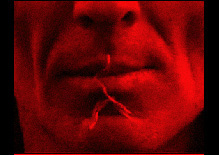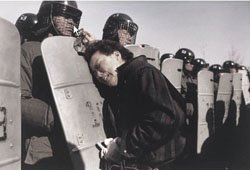Crying foul over chicanery at Armenia's polls and the honeyed tones of European diplomacy.
by Marietta de Pourbaix-Lundin and Matyas Eorsi
Transitions Online.
[The Parliamentary Assembly of the Council of Europe has threatened to suspend Armenia’s voting rights in the body unless it makes considerable progress toward democratic and judicial reforms by PACE’s June session. PACE sent observers to witness Armenia’s presidential election in February. It declared the voting to be “mostly in line with the country’s international commitments, although further improvements are necessary to address remaining challenges.” John Prescott, a former British deputy prime minister who headed the delegation, said, “While we noted improvements in the framework for these elections, problems with its implementation, especially during the vote count, in some cases undermined the trust of the people.” Marietta de Pourbaix-Lundin, a parliamentarian from Sweden who was part of the Armenia mission, considered that an understatement. She delivered her speech during PACE’s 14 April session.]
I have been in this parliamentary assembly since January 2007 and I have observed elections in four countries: Turkey, Ukraine, Russia and Armenia. The elections I observed in Armenia were the worst I have seen so far. The opening of the polling stations and the proceedings on the day were not too bad, but the counting in the polling station that I chose to visit was a disaster. Everything that could go wrong did go wrong. The number of voters who had voted and who had been marked on the list of voters was not counted, unused ballot papers were not destroyed and the protocol in which the results were to be entered had already been signed by members of the election committee.
Pourbaix-Lundin The most serious incident involved the chairperson
of the local election committee reading out the wrong names when
the ballot papers were to be put into different piles for the nine
candidates. The chairperson was well aware of what she was doing. She
was taking votes from Levon Ter-Petrosian and allocating them to the
[then-] prime minister, Serzh Sarkisian. Election officials tried
to hide what they were doing by holding their hands over the ballot
papers or by placing them in the middle of the piles so that I could
not see them.
When the officials were supposed to sum up the votes for the
different candidates, 100 votes were missing. I know that I was
not supposed to say anything but I could not help mentioning what
I had seen, so the officials pretended to count the votes quickly
and then decided that those votes should go to Serzh Sarkisian,
the guy who won the election. All candidates were allowed to have
proxies to observe the elections and the counting, but the only
observers at the polling station I chose were three young men from
Serzh Sarkisian's party. These three young men created an unpleasant
and uneasy atmosphere in the room. My interpreter was very scared
and asked me not to say anything more but just to observe and take
notice. I noticed that all the election officials were well aware of
what they were doing and they felt uneasy when I stood behind them
watching the electoral fraud. But that did not prevent them from
continuing to do what they had probably already planned, namely to
ensure that the sitting prime minister got enough votes so that there
would be no need for a second round. If what I observed occurred in
just one-tenth of the polling stations, of course there would have
been an effect on the result. I reported everything that I saw and
returned to my hotel disillusioned, upset and tired. I could not sleep.
I am very critical of the fact that from a press conference the
following day you could have got the impression that the election had
been conducted in the most correct way and according to international
standards. Do we help the Armenian people by believing that? I do
not think so.
I also went to visit the parliament building. I tried to take a
photograph, but three policemen and guards rushed after me and said,
"No, no. You can't take a photo." I asked them in Russian, "Why?" and
they told me that the parliament was "secret." That summarizes very
well the current position in Armenia. If a stronghold of democracy,
which is what a parliament should be, is secret, there are no
opportunities for democracy, transparency, human rights or free and
fair elections.
[Three days later, during another session on the Armenian election,
Hungarian delegate Matyas Eorsi made the following remarks:]
One problem is that we often tolerate rigged elections. If you visit
the assembly's website, you will often see headlines in the "news"
section that say, "One step towards democracy"; we all know that
we are not telling the truth. There can be some improvements in the
election environment, but very often the elections in question are
rigged. If we want to be helpful to those countries, the least we
can do is speak up and tell the truth. Very often, when we discuss
our relationship with member countries where there are democratic or
election deficits, we reiterate the point that we have to reinforce our
consultation with the governments of those countries so that elections
can be conducted better, but if there are shortcomings in an election
or administrative problems, we can do a lot to improve those elections.
In a country where an election is rigged, or has involved fraud or
cheating, what the hell can we discuss with those governments? Can we
say, "Please do not do this?" Of course they are fully aware of what
they are doing. I do not think it is a matter of consultation. One
of the major problems in Armenia, aside from what happened on that
tragic day, is the general distrust of the democratic processes among
the population because of the rigged elections. At the end of the
day, those who lose the election cannot disprove the legitimacy of
the election because of the procedures, which they have become used
to. Of course it matters who wins an election, but it matters much
more that wider society should be able to trust and have confidence
in the constitution and the electoral processes.
The Alliance of Liberals and Democrats for Europe fully supports the
recommendations of the rapporteurs that call for dialogue. ... The
recommendations also call for the release of political prisoners,
but they put the point somewhat more nicely, and they call for the
removal of the amendments on the election law that resulted in the
rigged elections. We support that, but if we are honest to ourselves,
we all know that the preconditions will never be met. I do not think
that the political environment is such that the government could make
such a compromise.
Marietta de Pourbaix-Lundin is a Swedish member of the Parliamentary
Assembly of the Council of Europe. Matyas Eorsi is a Hungarian member
of PACE.
the full article here
skip to main |
skip to sidebar



La police d'émeute et une mère aprés que son fils ait été arrêté à la démonstration accusant le gouvernement de la fraude dans les élections présidentielles. Corée 1978. Anthony Suau

Tiananmen 1989

Election - Ընտրություններ /// Twitter / himaarmenia
Վերջին նորություններ
liens / կայքեր
- e-Channel
- ՀՀ քաղաքական բանտարկյալների եւ հալածյալների պաշտպանության կոմիտե
- Ծիծեռնակ
- massisweekly.com
- hima.blogspot.com
- armenianow.com
- hetq.am
- infoarmenia.org
- ditord.wordpress.com
- payqar.net
- eurasianet /armenia: vote 2008
- Photos - NYT
- yevrobatsi.org
- a1plus.am
- aravot.am
- armenaker.blog
- martimek.livejournal.com
ARCHIVE
-
▼
2008
(74)
-
▼
avril
(16)
- Genocide
- Election Secrets Revealed
- ՀԱՂԹԵԼՈՒ ԵՆՔ
- Gagik Tsarukyan to open world-class casino in Arme...
- Erervan. La premiere manifestation apres le premie...
- Résolution
- APPEAL TO THE PARLIAMENTARY ASSEMBLY OF THE COUNCI...
- Lettre aux delegués du Conseil de l'Europe
- Կոչ
- STATEMENT
- 40 jours - Hommage aux victimes
- Հայաստան - Արցախ (2)
- Նրանք մեր ընտանիքի անդամները չեն:
- Հայտարարություն
- ...չեմ հրաժարվի ոչ մի բառից ու ստորակետից
- no comments
-
▼
avril
(16)
PETITION
ՀԱՅՏԱՐԱՐՈՒԹՅՈՒՆԵՐ DECLARATIONS

Comité SDA - հայ - fr
Human Rights Watch - eng
Lettre de femmes et mères- fr
Հավատացեալները ԱՀ Կաթողիկոսին - հայ
NGOs Arménie -eng
Policy Forum Armenia - eng
Lettre au Secrétaire Général de l'OSCE (Allemagne) - de
Pétition à l'ONU - eng
Groupe parlementaire Suisse-Arménie - fr
Conseil National Arménien - fr
Sos Armenia (Georgie) - eng
MCC à R. Kocharian - eng
Sos NGOs Arménie - eng
Parti Conservative - eng
To Aremenians of America - eng
Human Rights Watch - eng
Lettre de femmes et mères- fr
Հավատացեալները ԱՀ Կաթողիկոսին - հայ
NGOs Arménie -eng
Policy Forum Armenia - eng
Lettre au Secrétaire Général de l'OSCE (Allemagne) - de
Pétition à l'ONU - eng
Groupe parlementaire Suisse-Arménie - fr
Conseil National Arménien - fr
Sos Armenia (Georgie) - eng
MCC à R. Kocharian - eng
Sos NGOs Arménie - eng
Parti Conservative - eng
To Aremenians of America - eng
"JAMANAK" et "PAIQAR" EN PDF
Global Voices Online

HISTOIRE / ՊԱՏՄՈՒԹՅՈՒՆԻՑ

La police d'émeute et une mère aprés que son fils ait été arrêté à la démonstration accusant le gouvernement de la fraude dans les élections présidentielles. Corée 1978. Anthony Suau
"Առաջ Հայաստան"...

Tiananmen 1989
ընդամենը
այցելում




